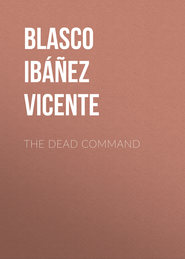По всем вопросам обращайтесь на: info@litportal.ru
(©) 2003-2024.
✖
Luna Benamor
Настройки чтения
Размер шрифта
Высота строк
Поля
"Huerco, what have you come for?… Are you looking for Horabuena? Horabuena is not here; she has gone forever. She who is here is named… Luna. Sweet Lunita, beautiful Lunita. Off with you, Huerco, begone! She whom you seek is not here."
For some time she was calm, then her returning fears made her speak again to her importunate, lugubrious guest. There he was again! She could feel his presence.
"Huerco, I tell you you're mistaken! Horabuena is gone; look for her elsewhere. Only Luna is here. Sweet Lunita, precious Lunita."
And so great was her insistence that at last she succeeded in deceiving Huerco with her entreating, humble voice, although it is true that, to give an air of truth to the deceit, on the following day, at a synagogue ceremony, the name of Horabuena was changed to that of Luna.
Aguirre listened to these revelations with the same interest as that with which he would read a novel about a far-off, exotic land that he was never to behold.
It was on this same morning that the consul revealed the proposal which for several days he had guarded in his thoughts, afraid to express it. Why not love each other? Why not be sweethearts? There was something providential about the way the two had met; they should not fail to take advantage of the fate which had brought them together. To have become acquainted! To have met, despite the difference of countries and of races!…
Luna protested, but her protest was a smiling one. What madness! Sweethearts? Why? They could not marry; they were of different faiths. Besides, he had to leave. But Aguirre interrupted resolutely:
"Don't reason. Just close your eyes. In love there should be no reflection. Good sense and the conventionalities are for persons who don't love each other. Say yes, and afterwards time and our good luck will arrange everything."
Luna laughed, amused by Aguirre's grave countenance and the vehemence of his speech.
"Sweethearts in the Spanish fashion?… Believe me, I am tempted to assent. You will go off and forget me, just as you've doubtless forgotten others; and I'll be left cherishing the remembrance of you. Excellent. We'll see each other every day and will chat about our affairs. Serenades are not possible here, nor can you place your cape at my feet without being considered crazy. But that doesn't matter. We'll be sweethearts; I should love to see what it's like."
She laughed as she spoke, with her eyes closed, just like a child to whom a pleasant game has been proposed. Soon she opened her eyes wide, as if something forgotten had reawakened in her with a painful pressure. She was pale. Aguirre could guess what she was trying to say. She was about to tell him of her previous betrothal, of that Jewish fiancé who was in America and might return. But after a brief pause of indecision she returned to her former attitude, without breaking the silence. Luis was grateful to her for this. She desired to conceal her past, as do all women in the first moment of love.
"Agreed. We'll be sweethearts. Let's see, consul. Say pretty things to me, of the sort that you folks say in Spain when you come to the grating."
That morning Luna returned to her house somewhat late for the lunch hour. The family was awaiting her impatiently. Zabulon looked at his niece with a stern glance. Her cousins Sol and Estrella alluded to the Spaniard in a jesting manner. The patriarch's eyes grew moist as he spoke of Spain and its consul.
Meanwhile the latter had stopped at the door of the Hindu bazaar to exchange a few words with Khiamull. He felt the necessity of sharing his brimming happiness with another. The Hindu was greener than ever. He coughed frequently and his smile, which resembled that of a bronze child, was really a dolorous grimace.
"Khiamull, long live love! Believe me, for I know much about life. You are sickly and some day you'll die, without beholding the sacred river of your native land. What you need is a companion, a girl from Gibraltar… or rather, from La Línea; a half gypsy, with her cloak, pinks in her hair and alluring manners. Am I not right, Khiamull?…"
The Hindu smiled with a certain scorn, shaking his head. No. Every one to his own. He was of his race and lived in voluntary solitude among the whites. Man can do nothing against the sympathies and aversions of the blood. Brahma, who was the sum of divine wisdom, separated all creatures into castes.
"But, man!… friend Khiamull! It seems to me that a girl of the kind I've mentioned is by no means to be despised...."
The Hindu smiled once more at the speaker's ignorance. Every race has its own tastes and its sense of smell. To Aguirre, who was a good fellow, he would dare to reveal a terrible secret. Did he see those whites, the Europeans, so content with their cleanliness and their baths?… They were all impure, polluted by a natural stench which it was impossible for them to wipe out. The son of the land of the lotus and the sacred clay was forced to make an effort in order to endure contact with them… They all smelled of raw meat.
III
IT was a winter afternoon; the sky was overcast and the air was gray, but it was not cold. Luna and the Spaniard were walking slowly along the road that leads to Europa Point, which is the extreme end of the peninsula of Gibraltar. They had left behind them the Alameda and the banks of the Arsenal, passing through leafy gardens, along reddish villas inhabited by officers of army and navy, huge hospitals resembling small towns, and garrisons that seemed like convents, with numerous galleries in which swarms of children were scurrying about; here, too, clothes and tableware were being washed and cleaned by the soldiers' wives—courageous wanderers over the globe, as much at home in the garrisons of India as in those of Canada. The fog concealed from view the coast of Africa, lending to the Strait the appearance of a shoreless sea. Before the pair of lovers stretched the dark waters of the bay, and the promontory of Tarifa revealed its black outline faintly in the fog, resembling a fabulous rhinoceros bearing upon its snout, like a horn, the tower of the lighthouse. Through the ashen-gray clouds there penetrated a timid sunbeam,—a triangle of misty light, similar to the luminous stream from a magic lantern,—which traced a large shaft of pale gold across the green-black surface of the sea. In the center of this circle of anemic light there floated, like a dying swan, the white spot of a sailboat.
The two lovers were oblivious to their surroundings. They walked along, engrossed in that amorous egotism which concentrates all life in a glance, or in the delicate contact of the bodies meeting and grazing each other at every step. Of all Nature there existed for them only the dying light of the afternoon, which permitted them to behold each other, and the rather warm breeze which, murmuring among the cacti and the palms, seemed to serve as the musical accompaniment to their conversation. At their right rumbled the far-off roar of the sea striking against the rocks. On their left reigned pastoral peace,—the melodious calm of the pines, broken from time to time only by the noise of the carts, which, followed by a platoon of soldiers in their shirt sleeves, wheeled up the roads of the mountain.
The two looked at each other with caressing eyes, smiling with the automatism of love; but in reality they were sad, with that sweet sadness which in itself constitutes a new voluptuousness. Luna, influenced by the positivism of her race, was gazing into the future, while Aguirre was content with the present moment, not caring to know what would be the end of this love. Why trouble oneself imagining obstacles!…
"I'm not like you, Luna. I have confidence in our lot. We'll marry and travel about the world. Don't let that frighten you. Remember how I came to know you. It was during the Feast of Tabernacles; you were eating almost on foot, like those gypsies that wander over the earth and resume their journey at the end of their meal. You come from a race of nomads which even today roams the world. I arrived just in time. We'll leave together; for I, too, am, because of my career, a wanderer. Always together! We will be able to find happiness in any land whatsoever. We'll carry springtime with us, the happiness of life, and will love each other deeply."
Luna, flattered by the vehemence of these words, nevertheless contracted her features into an expression of sadness.
"Child!" she murmured, with her Andalusian accent. "What sweet illusions… my precious consul! But only illusions, after all. How are we to marry? How can this be arranged?… Are you going to become a convert to my religion?"
Aguirre started with surprise and looked at Luna with eyes that betrayed his amazement.
"Man alive! I, turn Jew?…"
He was no model of pious enthusiasm. He had passed his days without paying much attention to religion. He knew that the world contained many creeds, but without doubt, as far as he was concerned, decent persons the world over were all Catholics. Besides, his influential uncle had warned him not to jest with these matters under penalty of hampering advancement in his career.
"No. No, I don't see the necessity of that.... But there must be some way of getting over the difficulty. I can't say what it is, but there surely must be one. At Paris I met very distinguished gentlemen who were married to women of your race. This can all be arranged. I assure you that it shall be. I have an idea! Tomorrow morning, if you wish, I'll go to see the chief Rabbi, your 'spiritual head,' as you call him. He seems to be a fine fellow; I've seen him several times upon the street; a well of wisdom, as your kind say. A pity that he goes about so unclean, smelling of rancid sanctity!… Now don't make such a wry face. It's a matter of minor importance! A little bit of soap can set it aright.... There, there, don't get angry. The gentleman really pleases me a great deal, with his little white goatee and his wee voice that seems to come from the other world!… I tell you I'm going to see him and say, 'Señor Rabbi, Luna and I adore each other and wish to many; not like the Jews, by contract and with the right to change their minds, but for all our life, for centuries and centuries. Bind us from head to foot, so that there'll be none in heaven or on earth that can separate us. I can't change my religion because that would be base, but I swear to you, by all my faith as a Christian, that Luna will be more cared for, pampered and adored than if I were Methuselah, King David, the prophet Habakkuk or any other of the gallants that figure in the Scriptures.'"
"Silence, you scamp!" interrupted the Jewess with superstitious anxiety, raising one hand to his lips to prevent him from continuing. "Seal your lips, sinner!"
"Very well. I'll be silent, but it must be agreed that we'll settle this one way or another. Do you believe it possible for any one to sever us after such a serious love affair… and such a long one?"
"Such a long one!" repeated Luna like an echo, imparting a grave expression to his words.
Aguirre, in his silence, seemed to be given over to a difficult mental calculation.
"At least a month long!" he said at last, as if in wonder at the length of time that had flown by.
"No, not a month," protested Luna. "More, much more!"
He resumed his meditation.
"Positively; more than a month. Thirty-eight days, counting today.... And seeing each other every day! And falling deeper and deeper in love each day!…"
They walked along in silence, their gaze lowered, as if overwhelmed by the great age of their love. Thirty-eight days!… Aguirre recalled a letter that he had received the day before, bristling with surprise and indignation. He had been in Gibraltar already two months without sailing for Oceanica. What sort of illness was this? If he did not care to assume his post, he ought to return to Madrid. The instability of his present position and the necessity of solving this passion which little by little had taken possession of him came to his thoughts with agonizing urgency.
Luna strolled on, her eyes upon the ground, moving her fingers as if counting.
"Yes, that's it. Thirty-eight.... Exactly! It seems impossible that you could have loved me for so long. Me! An old woman!"
And in response to Aguirre's bewildered glance she added, sadly, "You already know. I don't hide it.... Twenty-two years old. Many of my race marry at fourteen."
Her resignation was sincere; it was the resignation of the Oriental woman, accustomed to behold youth only in the bud of adolescence.
"Often I find it impossible to explain your love for me. I feel so proud of you!… My cousins, to vex me, try to find defects in you, and can't!… No, they can't! The other day you passed by my house and I was behind the window-blinds with Miriam, who was my nurse; she's a Jewess from Morocco, one of those who wear kerchiefs and wrappers. 'Look, Miriam, at that handsome chap, who belongs to our neighborhood.' Miriam looked. 'A Jew? No. That can't be. He walks erect, with a firm step, and our men walk haltingly, with their legs doubled as if they were about to kneel. He has teeth like a wolf and eyes like daggers. He doesn't lower his head nor his gaze.' And that's how you are. Miriam was right. You stand out from among all the young men of my blood. Not that they lack courage; there are some as strong as the Maccabees; Massena, Napoleon's companion, was one of us, but the natural attitude of them all, before they are transformed by anger, is one of humility and submission. We have been persecuted so much!… You have grown up in a different environment."
Afterwards the young woman seemed to regret her words. She was a bad Jewess; she scarcely had any faith in her beliefs and in her people; she went to the synagogue only on the Day of Atonement and on the occasion of other solemn, unavoidable ceremonies.
"I believe that I've been waiting for you forever. Now I am sure that I knew you long before seeing you. When I saw you for the first time, on that day during the Feast of the Tabernacles, I felt that something grave and decisive had occurred in my life. When I learned who you were, I became your slave and hungered anxiously for your first word."
Ah, Spain!… She was like old Aboab; her thoughts had often flown to the beautiful land of her forefathers, wrapped in mystery. At times she recalled it only to hate it, as one hates a beloved person, for his betrayals and his cruelties, without ceasing to love him. At others, she called to mind with delight the tales she had heard from her grandmother's lips, the songs with which she had been lulled to sleep as a child,—all the legends of the old Castilian land, abode of treasures, enchantments and love affairs, comparable only to the Bagdad of the Arabs, to the wonderful city of the thousand and one nights. Upon holidays, when the Jews remained secluded in the bosom of the family, old Aboab or Miriam, her nurse, had many a time beguiled her with ancient ballads in the manner of old Castile, that had been transmitted from generation to generation; stories of love affairs between arrogant, knightly Christians and beautiful Jewesses with fair complexions, large eyes and thick, ebony tresses, just like the holy beauties of the Scriptures.
En la ciudad de Toledo,
en la ciudad de Granada,
hay un garrido mancebo
que Diego León se llama.
Namorose de Thamar,
que era hebrea castellana....















